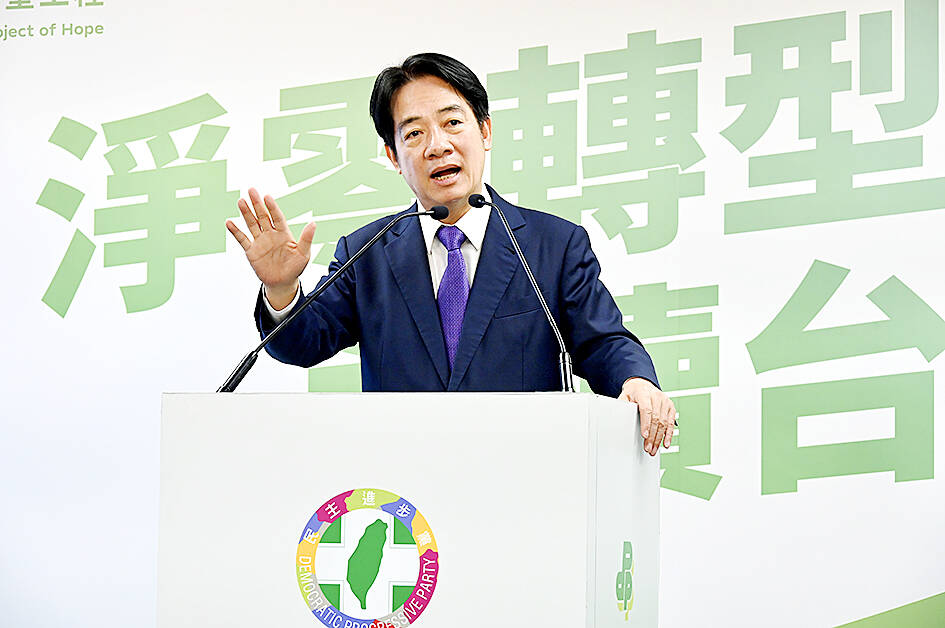If emerging technologies can resolve nuclear waste and guarantee safety, nuclear power could be a viable option for the nation, Vice President William Lai (賴清德), the Democratic Progressive Party’s (DPP) presidential candidate, told a news conference on his energy transition platform yesterday.
Lai was responding to a question of whether the increased percentage of liquified natural gas (LNG) in power generation would be an issue of national security, and whether the party’s “zero nuclear” stance was more ideological than practical.
Lai said the public has voted in all related referendums that it does not want another nuclear power plant, and that existing nuclear plants are being retired mainly due to public concern over waste storage and safety.

Photo: George Tsorng, Taipei Times
He also defended President Tsai Ing-wen’s (蔡英文) energy policy, saying that the president was not closing down nuclear power plants when they are still operational, but is proposing to transition the nation’s power grid to greener sources as per law.
The last operating nuclear power reactor is slated for retirement by mid-2025.
He said the choice is not motivated by political ideology and is fully compliant with the law and global trends.
The goal to achieve net zero carbon emissions by 2050 would not rely solely on solar or wind power, but would also depend on other diverse methods such as hydroelectric power, which would significantly reduce the nation’s reliance on LNG as a power source, he said.
His government would promote policies for zero waste, low-carbon emission foods and transportation networks, substitute device ownership with equivalent services and other policies to help promote a greener society, he said.
It would also establish an international consultant team to help the industrial transition to lower carbon emitting production methods to reduce the impact of “going green,” he added.
While the international community is striving to transition to net zero emissions, such an effort would inevitably harm others more, and the government should adopt a “no person/business left behind” mindset and assist all affected industries, he said.
Responding to criticism from New Taipei City Mayor Hou You-yi (侯友宜), the Chinese Nationalist Party (KMT) presidential nominee that he did not attend the televised policy debate on net zero carbon emissions, Lai said that Greenpeace and the International Climate Development Institute confirmed that Lai had not definitively said he would attend and he could not fit the forum into his schedule.
Lai said that he had presented his view and policy platforms on climate change, and he could deliver a report immediately if he were at a debate podium.
Lai also criticized Hou for dodging questions by offering a milquetoast “I will do my best” while criticizing Lai’s policies, adding that Hou should make more constructive comments so voters could better understand Hou’s platform and policies.
Additional reporting by CNA

Taiwan has received more than US$70 million in royalties as of the end of last year from developing the F-16V jet as countries worldwide purchase or upgrade to this popular model, government and military officials said on Saturday. Taiwan funded the development of the F-16V jet and ended up the sole investor as other countries withdrew from the program. Now the F-16V is increasingly popular and countries must pay Taiwan a percentage in royalties when they purchase new F-16V aircraft or upgrade older F-16 models. The next five years are expected to be the peak for these royalties, with Taiwan potentially earning

STAY IN YOUR LANE: As the US and Israel attack Iran, the ministry has warned China not to overstep by including Taiwanese citizens in its evacuation orders The Ministry of Foreign Affairs (MOFA) yesterday rebuked a statement by China’s embassy in Israel that it would evacuate Taiwanese holders of Chinese travel documents from Israel amid the latter’s escalating conflict with Iran. Tensions have risen across the Middle East in the wake of US and Israeli airstrikes on Iran beginning Saturday. China subsequently issued an evacuation notice for its citizens. In a news release, the Chinese embassy in Israel said holders of “Taiwan compatriot permits (台胞證)” issued to Taiwanese nationals by Chinese authorities for travel to China — could register for evacuation to Egypt. In Taipei, the ministry yesterday said Taiwan

Taiwan is awaiting official notification from the US regarding the status of the Agreement on Reciprocal Trade (ART) after the US Supreme Court ruled US President Donald Trump's global tariffs unconstitutional. Speaking to reporters before a legislative hearing today, Premier Cho Jung-tai (卓榮泰) said that Taiwan's negotiation team remains focused on ensuring that the bilateral trade deal remains intact despite the legal challenge to Trump's tariff policy. "The US has pledged to notify its trade partners once the subsequent administrative and legal processes are finalized, and that certainly includes Taiwan," Cho said when asked about opposition parties’ doubts that the ART was

If China chose to invade Taiwan tomorrow, it would only have to sever three undersea fiber-optic cable clusters to cause a data blackout, Jason Hsu (許毓仁), a senior fellow at the Hudson Institute and former Chinese Nationalist Party (KMT) legislator, told a US security panel yesterday. In a Taiwan contingency, cable disruption would be one of the earliest preinvasion actions and the signal that escalation had begun, he said, adding that Taiwan’s current cable repair capabilities are insufficient. The US-China Economic and Security Review Commission (USCC) yesterday held a hearing on US-China Competition Under the Sea, with Hsu speaking on